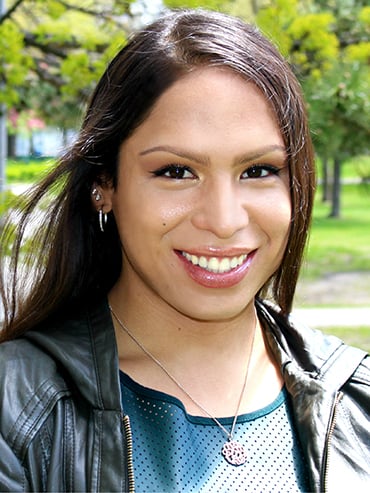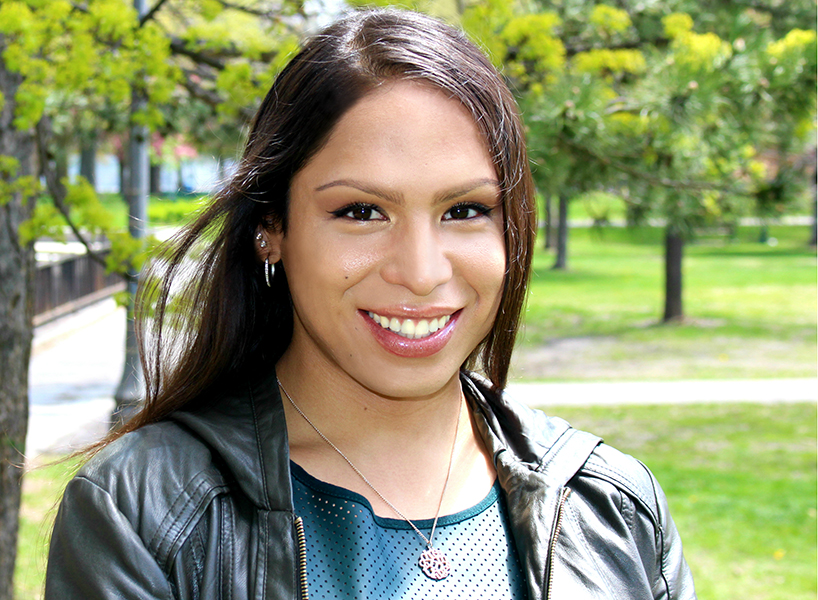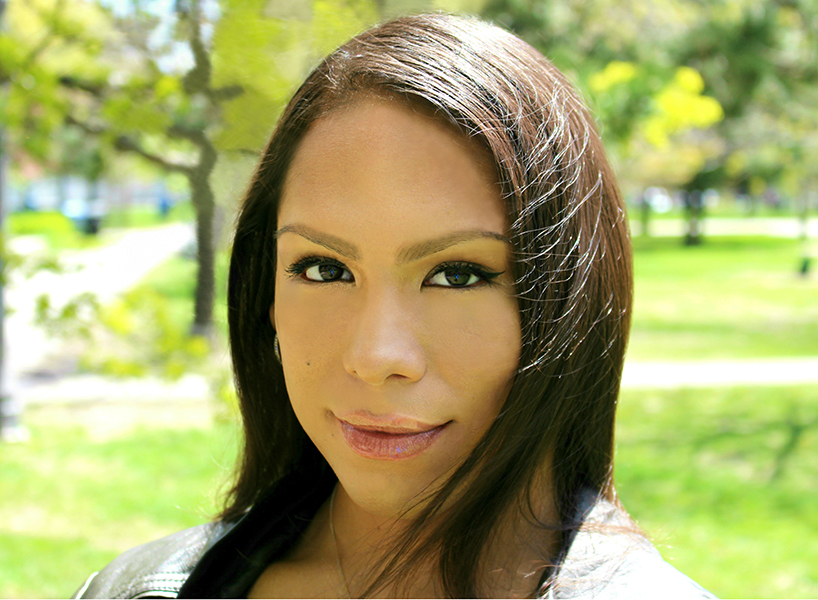What Does It Mean to Identify as Two-Spirit?
"Through the history of colonization in Canada, there were efforts to erase any homosexuality or queerness"


This interview was originally published on June 22, 2017.
Meet Kiley May: a Hotinonshón:ni Mohawk and Cayuga storyteller who helps others understand what it means to be two-spirit.
Raised on Six Nations of the Grand River Territory reserve, May now lives in Tkaronto (Toronto) where they work with various LGBTQ organizations promoting positive discussions about gender identity and sexual health. May identifies as two-spirit—as well as trans, queer and genderqueer—and uses the pronouns “she” and “they” interchangeably.
As part of their outreach work, May leads free art workshops for members of the Indigenous two-spirit community, and works with the Native Youth Sexual Health Network helping facilitate talks at schools and reserves. Pride Toronto named May its 2017 Youth Ambassador for their community work.
FLARE chatted with May about what it means to be two-spirit, how colonialism has affected Indigenous gender identities and how they feel about being honoured by Pride Toronto. Here’s what they shared.
What does it mean to you to identify as two-spirit?
I can only speak from my own lived experience. I have been doing a lot of research for years, gathering knowledge and working in communities with other two-spirit people and started to come to my own understanding of what it means. There’s no simple definition, but generally, two-spirit is a person who identifies as Indigenous and extends to describe their gender, sexual or spiritual identity. Two-spirit has become an umbrella term that encompasses same gender or same sex attraction, but also a wide variety of gender variants. To me, being two-spirit is more about your gender identity and places emphasis on your gender role and contributions to your community. Often there is cultural and spiritual aspect to it. It’s not just about sexuality.
Where does the term two-spirit come from?
It’s a relatively modern term. There were originally many different Indigenous nations on the North American continent, what we call Turtle Island. A lot of these nations had people who in modern terms could be identified as transgender, intersex, queer, bisexual, lesbian and gay, and they all had their own individual language and words to describe them. But through the history of colonization in Canada, there were efforts to erase any homosexuality or queerness… so a lot of our practices, histories and culture were erased—including a lot of our two-spirit knowledge.
It got to a point in recent history where Indigenous people—specifically two-spirit, gay, lesbian, bisexual and transgender people—came together at a conference in Manitoba in 1990 and came up with a term that would unite everybody. The term two-spirit [was created] because people realized that we had lost our traditional words to describe ourselves. They came up with this present-day English term to describe our experience of being Indigenous and LGBTQI+. It comes from the Anishinaabemowin word niizh manidoowag. It describes somebody who has two spirits; to carry both masculine and feminine spirits. I think that speaks to being two-spirit today and our gender experiences here and now.

What are some key differences between identifying as trans and identifying as two-spirit?
This is where it can get complicated, as most identities are. What’s important to note is that not all Indigenous LGBTQI+ people identify as two-spirit. There are various ways and words that people choose to express their gender and sexual identities. Some people identify as Indigenous and LGBTQI+, but not two-spirit, while some identify as two-spirit and not LGBTQI+. Personally, I identify as two-spirit, as well as transgender, queer and genderqueer, but it changes according to the context. For example, if I’m at an Indigenous two-spirit community gathering, I identify as two-spirit because that is easily understood. But in some contexts, I just identify as transgender or queer. Also, someone who is Indigenous could call themselves two-spirit and transgender, but if you are a white transgender person, you couldn’t call yourself two-spirit because you’re not Indigenous.
How important is it for people to use preferred pronouns when it comes to addressing trans or two-spirit people?
Extremely important. When a trans person asks you to call them by a certain pronoun, or when you learn a trans person uses a certain pronoun, [using it] is the right thing to do. It’s really important for the individual and their sense of self, because really you’re acknowledging and respecting that person’s identity. I think of the younger generation who needs that validation and protection. Respecting people’s pronouns sends a message of acceptance, inclusion and true equality. It can also come down to safety. If a trans person is continually not being called by their preferred pronoun, that could have detrimental effects [on them]. It can be oppressive and traumatizing.
Do you think that society’s understanding of gender identity is progressing?
There are things changing and evolving on a social level, but also on a government level. There’s been some changes like the passing of Bill C-16 [which defends transgender rights], but there’s more work to be done when it comes to the medical systems that we navigate daily. For example, I went through a legal name and gender change, and through the process of getting funded by OHIP for my genital reconstruction surgery. It’s possible, but it is a major hassle. It is a whole bureaucratic rigmarole, and it’s a timely process—and it’s costly. It’s not accessible to everyone and not affordable. It needs to be a much easier, streamlined and accessible process.
Pride Toronto recognized you as their 2017 Youth Ambassador. How does that feel?
It’s very exciting and an honour, and I’m grateful to have been selected. But, I did have some mixed feelings about it, specifically because this year is Canada’s big 150 celebration. It’s a huge celebration for the country of Canada, but what I’m noticing is there’s been a lot of “propping up” of Indigenous people this year, where Indigenous people are being celebrated, seemingly more than usual. I wondered whether my role was because I actually deserved it, or if it was just because organizations were trying to save face by promoting Indigenous people this year. I’ve had lots of people tell me that I was being silly, and totally deserved the award. I know I’ve done lots of work in the community over the past five years, so it’s good to be recognized. I wish that every year in the future there will be two-spirit and Indigenous LGBTQI+ people who are honoured and celebrated on this land from which we originate. That’s how it ought to be as the first people of this country.
Related:
12 Queer Women Talk #Pride
What Indigenous Activists Want You to Know About the MMIWG Inquiry
GLAAD Report Says LGBTQ People Are “Nearly Invisible” in Hollywood








